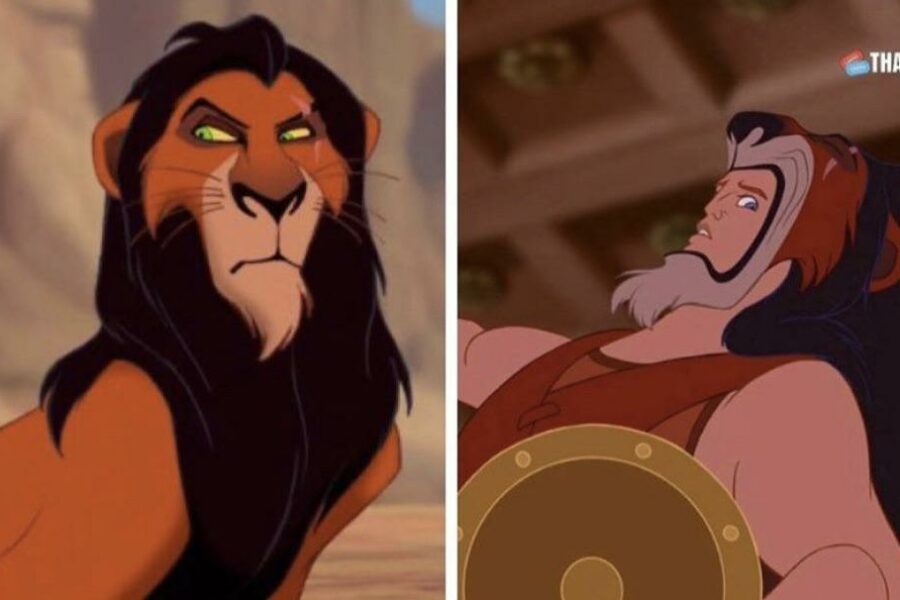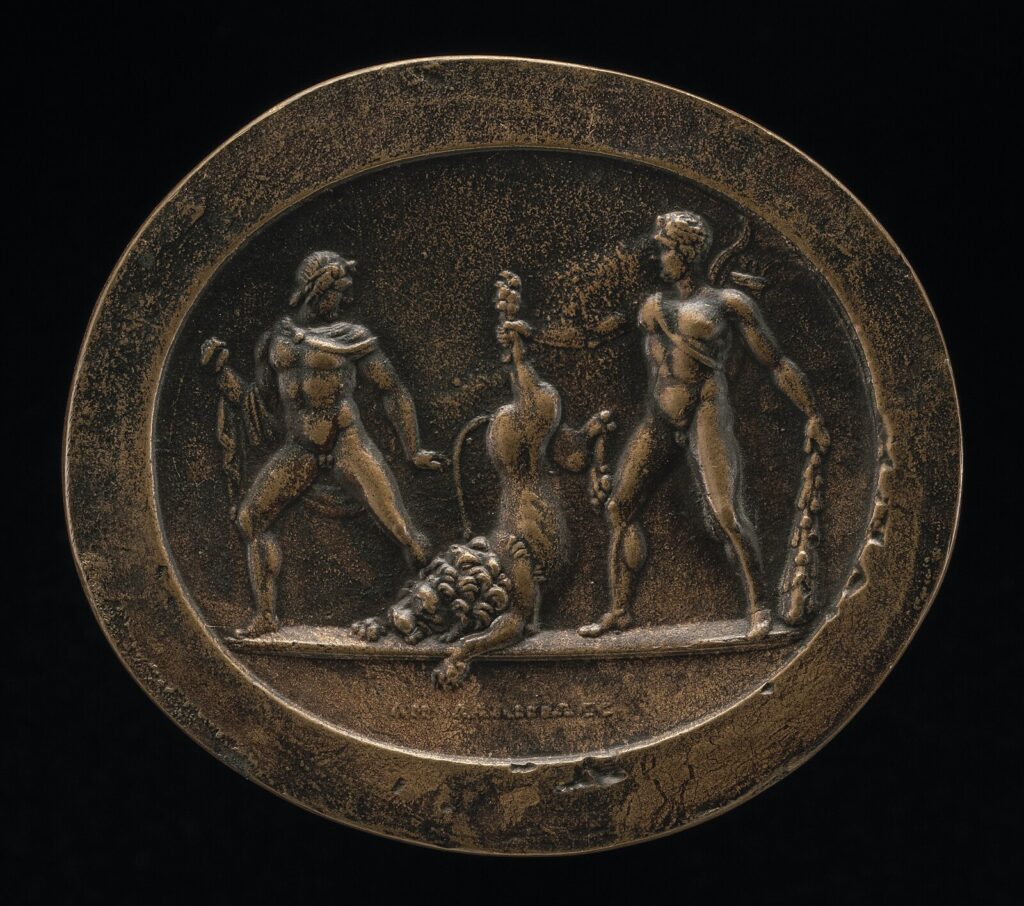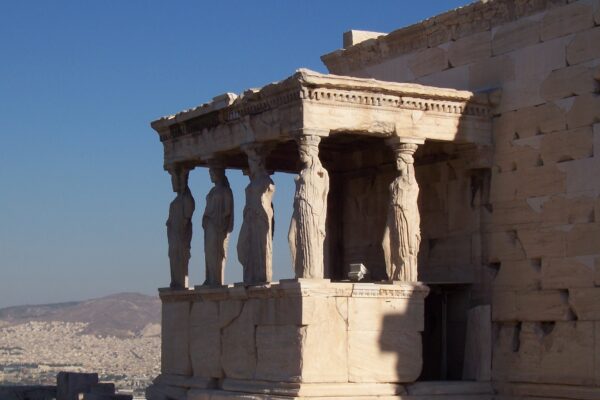
Scar was skeptical about his planned cameo in the Hercules movie.
Meeting 12: In which Hercules is a terrible student, a terrible husband, a terrible father, but a really good stylist. And hugs a lion.
This episode of Mythology Pitch Meetings brought to you by CLAS-C 205 Classical Mythology.
Have you ever wondered how your favorite Classical Myths came to be? This is absolutely not how that happened, but it could have happened, maybe, and that’s the point of mythology. Shout-out to Ryan George, whose Pitch Meeting video series inspired the Muses.
CALLIOPE, MUSE OF EPIC POETRY: So you have another one of those Hercules myths to pitch to me?
HOMER, UNCONTESTED G.O.A.T OF ANCIENT POETRY: Do I! This one is going to explain how he gets launched on his greatest adventure. You’re going to love it. Very heroic.
CLIO, MUSE OF HISTORY (interrupting): I should warn you, the definition of “hero” is going to change over time. Right now it just means an elite male who does impressively difficult things that no one else can do. Eventually it will mean anyone who does impressively good things.
HOMER: That’s the stupidest thing I’ve ever heard. Who wants to do good things? Doing good things is often really uncomfortable and it can even be difficult to determine what is “good.” I’m sticking with really obvious life questions, like, “how do I kill this monster lion with an impervious hide, so I can wear his skin as a trademark?”
CALLIOPE: Oooh, that question please! The killer-lion-couture one.

”Dude, put this on. Seriously, it’ll look awesome! Don’t make me club you over this.”
HOMER: So. Hercules, the mortal son of Zeus, grows up in the palace of King Amphitryon, doing heroic things, and developing just the most amazing anger management issues.
CALLIOPE: What sorts of heroic things? One of them should have to do with singing my poetry. Competitive poetry singing. Because singing poems is a very manly competitive sport and always will be.
HOMER: Um, ok, that’s pretty specific…one time his music teacher Linus criticizes his lyre playing. So Hercules beats his teacher to death with a lyre!
CLIO: That is impressive. Lyres are made out of tortoise shells and wood, so they’re pretty fragile. Good form with poor materials on Hercules’ part.
CALLIOPE: Wait, that wouldn’t be my son Linus, would it?
HOMER: Um, nope? Moving quickly on, Hera still has it out for Hercules, because he’s the bastard son of her husband Zeus, which admittedly is a pretty populous club. So it does take some time for her to work her way through her list and circle back. In the meantime, Hercules has gotten married to this princess named Megara and they have several kids, which gives Hera a lot to work with, since she’s the goddess of marriage and childbirth. She strikes Hercules mad, and in his madness he slaughters all his family!
CALLIOPE: What. The. Actual…As the goddess of marriage and childbirth, her solution is to slaughter his products of marriage and childbirths?
HOMER: (shrugs)

Hercules slays in just the most fabulous hat.
CALLIOPE: Well. That escalated very quickly! How is he going to get over killing his entire family?
HOMER: Standard operating procedure: he heads off to Delphi to ask the Oracle to purify him.
CALLIOPE: The Oracle at Delphi? That blitzed out teenager sitting in a crockpot shouting nonsense and riddles?
HOMER: The very same.
CALLIOPE: And she’s supposed to make him feel better about murdering his family? Is that something she can do?
HOMER: Make him feel better? Why would he feel bad about it? He was possessed by the goddess, it wasn’t his idea.
CALLIOPE: Yeah, but he murdered his family. His regret must be crushing him. And it’ll be nearly impossible for people to view him as heroic after that.
CLIO: Actually, it will be super easy, barely an inconvenience. A Greek hero just has to do impossibly difficult things, remember? And slaughtering your whole family is pretty difficult, so in a way, he’s right on track as a hero. The reason Hercules goes to Delphi is to get purified from miasma, a sort of social ick you get on you whenever you murder a member of your family. The Oracle can ask the gods to remove it from you, and if they agree, then you’re good as new. Sort of like going through a soul car wash.
HOMER: Exactly. And it would have worked this time too, except for that meddling Hera. She gets to the Oracle first, and makes her tell Hercules that he can only be purified once he completes ten impossible tasks set for him by his cousin King Eurystheus.
CALLIOPE: How does that have anything to do with atoning for murdering his family?
HOMER: Nothing whatsoever. You can forget about his family. They’re just a plot point to get him indebted to Delphi and then Eurystheus.
CALLIOPE: So his wife Megara wasn’t the love of his life?
HOMER: Who?

Meg learns her eventual mythological fate.
CALLIOPE: Never mind. So what sort of great tasks does Eurystheus assign to Hercules?
HOMER: Well, Hera once again is ahead of Hercules, and orders Eurystheus to assign dangerous tasks that will inevitably kill Hercules if he tries to complete them. Eurystheus isn’t crazy about this plan, because he’s really just some dude, and Hercules is pretty intimidating. But Hera is the definition of intimidating, so Eurystheus is really in between a rock and an enraged goddess. He decides to risk being beaten to death musically, rather than having to slaughter his whole family, and sides with Hera.
CALLIOPE: If Hera wants Hercules dead so badly, why doesn’t she just kill him herself?
HOMER: Well, if she does that then the story wouldn’t happen. But I guess we can say that she doesn’t want to risk going against Zeus directly.
CALLIOPE: But doesn’t she go against Zeus directly all the time?
HOMER: It is indeed sort of her trademark. Maybe she wants a challenge? It probably gets boring being immortal.
CLIO: Does it ever. Humans always forget the past and are doomed to repeat it, so watching you mortals is like watching the same episodes in syndication over and over and over again.
HOMER: I don’t know what that means. Anyway, Hercules shows up at Eurystheus’ palace and demands a task to complete. So Eurystheus goes with the first thing he can think of, which is to kill this lion that’s been terrorizing the area around Nemea. Only this isn’t just any lion: it’s super big, super strong, and its hide cannot be pierced by any blade!
CALLIOPE: That sounds terrifying! How is Hercules going to overcome that monster?
HOMER: By wrestling!
CALLIOPE: Wait, what? Like the sport?
HOMER: Exactly like the sport. Hercules grabs the lion and wrestles it until he can get a grip on its jaws. Then he rips its jaws apart and kills it!
CALLIOPE: I feel like you could probably skip the wrestling and go straight to the jaw ripping.
CLIO: Actually, the whole wrestling motif is supposed to evoke the experience of young elite males in the gymnasium, where they wrestled naked with each other in order to become better citizens. So in art the Nemean Lion often serves as a metaphor for a young man’s overcoming his youth and entering into full adulthood.

Oh sure, the Ancient Greeks can put this on a coin, but the USA can’t manage to put a woman on their currency.
HOMER: I’m sorry, back up, did you say young men are going to learn to be better citizens by naked wrestling?
CLIO: This will be after your time. Ancient Greeks will get really into sports as a sign of excellence in their citizenry. And they’ll do nearly all their sports naked.
HOMER: But, how would wrestling help people be citizens? And why are they naked? Is naked competition some highly productive social innovation that the Greeks will introduce to the world, like theater?
CLIO: No, the rest of the ancient world will think it’s looney too and make fun of the Greeks for it. But the whole sports competition movement will get an odd revival in the 19th century and go on to be a very effective structure for nationalism and money laundering.
HOMER: Well, I’m happy to report that the first thing Hercules does when he has finished his first great labor is he puts on some damn clothes. He uses the Nemean Lion’s own claws to skin it, and then he wears it as as an impervious cloak.
CALLIOPE: Ew, does he take it to a tanner first or does he just walk around wearing a bloody, rotting lion hide?
CLIO: He must eventually get it tanned, because he’s going to wear it all the time going forward. It’ll become one of his many, many trademarks. Sometimes it will look like a tailored suit!

Ladies.
CALLIOPE: So, to sum up this part of the story: our hero beats a man to death for trying to teach him something, kills his entire family in a whoopsy-daisy moment, death-wrestles an endangered species, and then goes big on the “fur is fashion” movement. And you’re sure this guy is heroic? Did he at least cure Nemea of their lion problem?
HOMER: (shrugging) Sure, I guess. That isn’t really going to be the point of any of these labors, though.
CALLIOPE: What isn’t?
HOMER: Helping people. Any benefit accrued to anyone besides Hercules will be purely accidental. Monsters over morality, remember?
Share on Instagram, or really wherever you want.
To learn more about how Greek heroes were more horrible than heroic, enroll in CLAS-C 205 Classical Mythology, coming up next semester Spring 2024! Or for more discussion of why Greeks wrestled naked (spoiler alert, we have no real idea–they just did them), look for CLAS-C 213 Sport and Competition in the Ancient World, also coming up Spring 2024! Can’t get enough of Ancient Greece and Rome? Earn a Classics Minor in just 15 credits!


